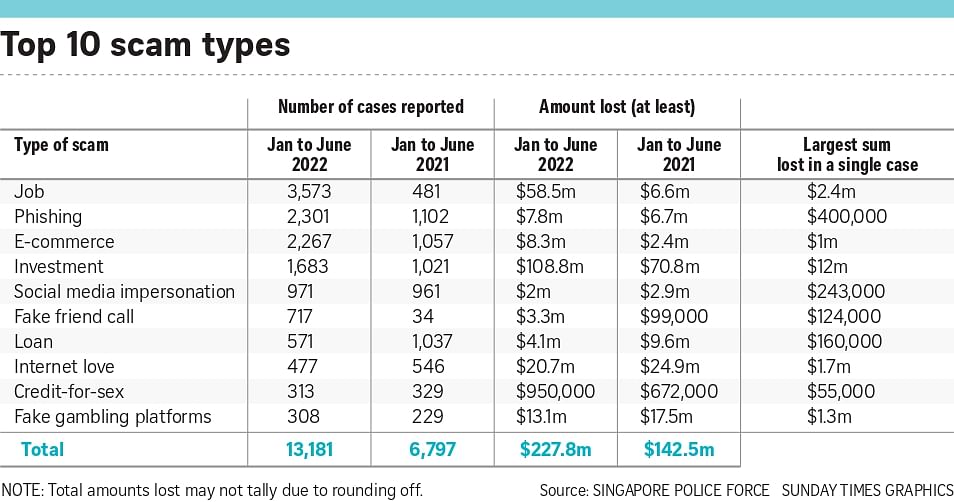Staying ahead of scammers an opportunity for S'pore to boost its financial reputation: Experts
Sign up now: Get ST's newsletters delivered to your inbox

A total of $346.5 million was lost to all scams in the first half of this year.
PHOTO: ST FILE
Follow topic:
SINGAPORE - To tackle scams, financial institutions and companies must stay ahead of scammers because reacting to the situation alone is not enough, said financial experts.
Especially as scammers will always find new ways to cheat victims.
They said to stay ahead of scammers, the Government, police, telcos and financial institutions need to coordinate their efforts and harness technology to their advantage.
National University of Singapore business professor Lawrence Loh said scams in Singapore are of critical concern now and they need to be tackled quickly.
He said: "It is something we have to address and take quite seriously so as to maintain our standing as one of the key financial hubs in the world, especially in Asia."
He noted the reputational impact, however little, may lead to fewer business opportunities here and these opportunities are one of the fundamental creators of jobs.
"But with that being said, business decision-makers from around the world will consider other factors, such as Singapore's strong measures to tackle scams, when they decide whether to invest here," said Prof Loh.
According to the mid-year crime statistics released by the police last month, 14,349 scam cases were reported this year, almost double the 7,746 cases reported in the same period last year.
A total of $346.5 million was lost to all scams in the first half of this year, up from the $225.5 million lost during the same period last year.
The amount lost in the first six months of this year is more than half of the $633.3 million lost in the whole of last year.
Among the top scams of concern so far this year are job, phishing and e-commerce scams.
Dr Yan Li, senior lecturer at Nanyang Technological University's business school, said while the increasing amount lost to scams may have blemished Singapore's reputation as one of the safest countries in the world, it can be a huge win for the Republic if the authorities manage the situation well.
He said: "Scams are not unique to Singapore. They occur in many countries, especially wealthy ones.
"If we can find ways to curb such crimes successfully, then we not only set an example to other countries, we also strengthen our position as an attractive place for investors and foreign talent."
Dr Yan acknowledged, however, the difficulty of bringing swindlers to justice as many scam syndicates operate overseas.
He added: "Within Singapore, the Government can take more initiative in coordinating efforts with the police, telcos and financial institutions to fight scams.
"Sharing information, having a framework of good practices and legislating security measures will go a long way to protect those who are vulnerable."
Some progress has been made on this front, especially after a spate of high-profile phishing scams that saw 790 OCBC Bank customers lose $13.7 million in December last year.
These scams involved customers getting tricked into giving up their banking credentials and thus control of their bank accounts.
The Monetary Authority of Singapore (MAS) said in response to queries from The Sunday Times the number of digital banking phishing scams have declined since then but did not provide figures.
The central bank said: "We hope to see this downward trend continue but it is not a reason for complacency."
MAS announced in February it was working with the banking industry on a draft framework for the equitable sharing of losses suffered by scam victims. It intends to issue the consultation paper in the next couple of months.
The Association of Banks in Singapore noted there is no reason for investors and banks to lose confidence in Singapore's financial system as long as stakeholders - including customers, telcos and e-commerce platforms - play their part.
It said: "The data shows that bank systems remain secure, and there is effectiveness from surveillance efforts, as well as increased collaboration with the police on customer handling and recovery."
Technology has helped make people's lives more convenient but it has also brought more risks to security.
CIMB Private Banking economist Song Seng Wun said while banks and e-commerce companies push to make their systems more efficient and seamless for customers, they must also remember the possible dangers of such advancements.
"The ease for consumers can also be a temptation for criminals to exploit such convenience. The challenge is in striking a balance between the two and making sure we stay ahead of new scam methods," he said.
Mr Richard Soh, group head of integrated fraud management at UOB, said while the bank is vigilant against scams and their constantly evolving nature, the increasing sophistication of scammers has made the task more challenging.
He said: "Technology, given its accelerated transformation and wide access, has been a double-edged sword. (It can be used to) facilitate new types of scams, yet can also serve as controls and means to detect and prevent scams."

Mr Beaver Chua, head of anti-fraud at OCBC Bank's Group Financial Crime Compliance department, noted while anti-scam measures are imperative, customer education is a key defence against scams.
He said: "Scammers are the masters of deception. They carry out well-planned strategies - tapping human emotion, greed, and at times, the fear of missing out - to ultimately deceive victims into parting with their hard-earned money.
"It is important for everyone to exercise due diligence and remember the old adage that if it sounds too good to be true, it probably is."
Spotting scams
Signs
1. Scammers often pretend to be an individual or organisation you know
In some cases, fraudsters act like they are contacting you on behalf of law enforcement agencies or your "friend". They use technology to change the phone number that appears on your caller ID so what you see might not be real.
2. Scammers say there is a problem or a prize
They may say you are in trouble for committing a crime or someone in your family has been hurt. Others lie and say there is an amazing product to invest in.
3. Scammers pressure you to act
They may threaten to arrest you for wrongdoing or say your computer is about to be hacked and that you need to act immediately.
How to protect yourself
1. Block and report unsolicited calls and text messages from strangers
2. Do not give your personal or financial information away
Legitimate organisations will not call, e-mail or text you for your personal information and bank account numbers.
3. Pause and talk to someone you trust
Before you act on any instructions, talk to a friend or family member about what happened. If you are unsure, check with the organisation the scammers claim to be from.


